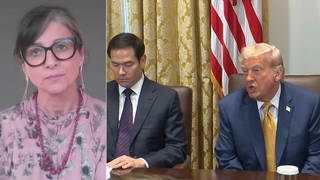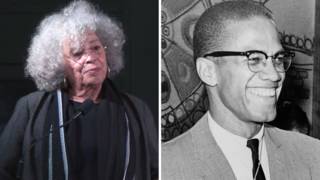
Topics
We remember the life of Bob Moses, the civil rights leader who left his job as a New York City high school teacher to register Black voters in Mississippi in the 1960s, facing down horrific violence and intimidation to become one of the icons of the movement. He died Sunday at age 86. Moses spent his later years as an advocate for improved math education, teaching thousands of students across the United States through the Algebra Project, the nonprofit he founded. Moses spoke to Democracy Now! in 2009, on the first day of the Obama presidency, recalling the 1964 fight for Black representation within the Democratic Party, the struggle against Jim Crow in the South and his passion for education. “In our country, I think we run sharecropper education,” Moses said, warning that unequal educational opportunities would continue racial disparities in the country. “We need a constitutional amendment, something which simply says every child in the country is a child of the country and is entitled to a quality public school education.”
Transcript
AMY GOODMAN: I’m Amy Goodman. This is Democracy Now!
Civil rights leader Bob Moses has died at the age of 86. He worked with SNCC, the Student Nonviolent Coordinating Committee, to register voters across Mississippi. In 1964, he helped organize the Mississippi Freedom Summer Project. Bob Moses went on to found the Algebra Project, devoted to improving access to education, particularly in math, for students of color.
In 2009, I spoke with Bob Moses on the first day of the Obama presidency. He talked about how civil rights activists in the '60s helped lay the foundation for Obama's presidency.
BOB MOSES: In order to become president of the United States, you have to be nominated by one of the two political parties, so the crucial thing for me was, in reflecting back, was the 1964 challenge of the Mississippi Freedom Democratic Party to the National Democratic Convention, because that was where the stage was set that allowed this to happen, because without opening up the national political structure in the country, this wasn’t going to happen. And, you know, we could have gotten the right to vote without the opening up of the national political party structure. And the party structure wasn’t opened up by getting the right to vote; the party structure was opened up by directly challenging in Mississippi the right of Mississippi to send an all-white delegation to the 1964 National Democratic Convention. And it was Fannie Lou Hamer and all the people in that delegation that really forced the national Democratic Party to open up, you know? …
And it was that — I mean, Barack Obama could not be running for president if he had not been able to secure a party to run for. And the Democratic Party, from the time of after the Civil War right until 1964, there were no Black delegates to the Democratic Party from the South, and it was that action, more than anything else, which opened up the national party structure and allowed eventually what is happening today to happen.
AMY GOODMAN: Can you take us from 1964, the battle for voting and civil rights, to what you see happening today, to the progress and also warnings that you have for us, or suggestions, recommendations?
BOB MOSES: So, my main idea — I try to look at this event through the lens of the evolution in this country, of the idea, who in our country are the people who have constitutional rights and constitutional responsibilities, and the evolution of the expansion of that. And I think the country kind of moves in cycles, which take roughly around three-quarters of a century. So, I look at the time from 1787 until the Civil War as a time in which we had, yes, constitutional people, mostly white men, but then we had constitutional property: African Americans who were slaves. And then we had this horrendous war. Six hundred thousand people are killed during the war. And we come out of the war, and Lincoln, whom Obama is rightly looking at — we get rid of the idea of constitutional property, but African Americans don’t quite become full-fledged citizens.
And when we were in Mississippi, people all the time were saying, “Well, we want to be first-class citizens,” and so, the implication being that they were second- or even third-class citizens. So, the civil rights movement — and here I have to — I think we have to give credibility to the sit-in movement, to the young Black students at the historically Black colleges who really dismantled Jim Crow in the area of its public accommodations with the sit-in movement. They actually dismantled that aspect of Jim Crow. So, then there was this dismantling of it around the right to vote and, what I was talking about earlier, also around the national party structure.
But, you know, when I was sitting in the federal district courthouse, I was in the witness stand, and if you remember, this was in the spring of 1963. And at that time, President Kennedy was still alive, Bobby Kennedy was attorney general, Burke Marshall was the assistant attorney general for civil rights, and John Doar was my lawyer. He was the chief litigator in the field. And the judge, Judge Clayton, was a federal district judge. We had taken hundreds of sharecroppers in Greenwood to register, and then, subsequently, the SNCC field secretaries had been arrested. And Burke had our cases removed to the federal courts. So, Judge Clayton looks over, and he wants to know why are we taking illiterates down to register to vote. And so, in a nutshell, our answer is, “Well, the country can’t have its cake and eat it, too. It can’t have denied a whole people access to literacy through its political arrangements and then turn around and say, 'Well, you can't access politics because you’re illiterate.’” And we won that struggle. We won it in the courts. And it was Judge Wisdom’s decision in the case of U.S. v. Louisiana, where he said, “Well, we can’t allow the state of Louisiana to have authority over the actual qualifications of voting. That has to be moved to the federal system.” So, the 1965 Voting Rights Act gave the federal government the responsibility of saying who could qualify for the right to vote.
But we didn’t win the issue of illiteracy, and I think that’s the issue that in this evolution of who are the constitutional people — the children of our country do not have a constitutional right to a public school education. And you have to look at the Rodriguez case, 1971, Mexican Americans who sued in Texas for equity. Their case went all the way up to the Supreme Court. And the Supreme Court said, you don’t — you can’t come here into the federal system for relief, because there’s no substantive federal right to a — constitutional right to a public school education in this country. …
I think, really, that in our country — and this is going to be a huge challenge for the Barack Obama administration — in our country, I think we run sharecropper education. That is, an education that you can trace, when the judge asked me that question, because in the Delta of Mississippi, sharecroppers were assigned to do a certain kind of work, and so the idea was you only needed a certain kind of education. So, if we carry that forward into the information age, then we will have serfs in our cities, just like we had serfs in the Delta of Mississippi in the industrial era. And this is the huge challenge facing our country. I think what we need is a movement for our constitutional rights. We need a constitutional amendment, something which simply says every child in the country is a child of the country and is entitled to a quality public school education.
AMY GOODMAN: That’s civil rights leader Bob Moses, former field secretary for SNCC, the Student Nonviolent Coordinating Committee, and founder of the Algebra Project. He’s died in Florida at the age of 86. To see our interview with him on Obama’s first inauguration, along with Alice Walker, go to democracynow.org. I’m Amy Goodman. Thanks for joining us.












Media Options